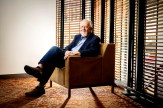A first for British politics
Britain has decided to air its first-ever televised prime ministerial debates. As the election nears, the three candidates—incumbent Gordon Brown of the Labour party, David Cameron of the Conservative party, and Nick Clegg of the Liberal Democratic party—will face off during three live debates over the course of the last three weeks in April. Alan Schroeder, associate professor of journalism at Northeastern and an expert on presidential debates, is in London for the debates and offers his perspective on this historic move in the U.K.
Britain’s decision to televise these debates between the Prime Minister candidates comes 50 years after the famous Kennedy-Nixon presidential debate. What took so long for Britain to enter this arena?
Debates were first proposed in Britain in 1964, but there has been a good deal of resistance to the concept.For starters, the U.K. follows a parliamentary system, in which prime ministers are not directly elected the way we elect presidents.Debates were thought to be too presidential an exercise for the more party-oriented British system.
Second, the candidates themselves have been reluctant to participate, particularly when their party is in the lead.It took a slump in the poll numbers of incumbent Prime Minister Gordon Brown to make these debates happen.Trailing in the polls, Brown saw political benefit in meeting his rivals on the debate stage.This is a good example of how you can always count on politicians to do what’s best for themselves electorally.
How are members of the British media covering the debates?
The debates are a huge story in the British press, especially this week as the big day approaches.Newspapers, radio and TV news, and the Internet are filled with stories on this topic, many of them revisiting the classic moments of American presidential debates.It’s not entirely surprising that the Brits are looking across the Atlantic for precedents, since they have none of their own.And, of course, the American presidential debates tend to be fairly well watched in the U.K., as they are around the world.
Part of my visit here is to see how the local media approach the story and to take part in interviews—and believe me, I am keeping very busy.
What’s unique about the format of the British debates?
These debates will follow a modified town-hall format in which an audience of voters will ask questions of the candidates. This format has been a staple of American debates, introduced at the presidential level by Bill Clinton, George H.W. Bush, and Ross Perot in 1992.
What’s different in the U.K. is that the voters at the town hall will have to submit their questions in advance.The questions will then be chosen by an independent editorial board and read on the air by the people who submitted them.All three candidates will have a crack at answering each of the questions, with little or no opportunity for follow-ups.
Unfortunately, these rules were devised by the campaigns, so there’s a lot of security built into the process for the candidates.
Televised debates were an American invention, but they have now become a feature of campaigns all over the world. How important are debates as a global phenomenon, and how much do they actually impact a voter’s decision?
Live TV debates have taken place during national elections in more than 70 countries around the world.Outside the U.S., a long debate tradition exists in Canada, France, Germany, the Netherlands, the Nordic countries, and Australia, and every year more and more nations join the list.In 2009, for example, televised candidate debates were inaugurated in unexpected places, such as Mongolia, Afghanistan, and Iran.
The conventional wisdom in America is that debates reinforce existing perceptions rather than change electoral outcomes. However, there have been a few elections—the 1960 presidential election between Nixon and Kennedy and the 1980 presidential election between Reagan and Carter—where they have arguably made a big difference.
At this stage, the British election appears to be more or less up for grabs, so there’s a good chance that this series of three debates over the next three weeks will be highly influential, especially in view of their novelty and the potentially large TV audiences they will attract.
American political consultants are heavily involved with the upcoming British debates. What are their roles?
American political consultants have made debate prep something of a cottage industry.For weeks now, high-level campaign professionals from the U.S. have been working with the various prime ministerial candidates behind the scenes—holding mock debates, consulting on performance issues, and helping to hone the rhetoric.Interestingly, the lead consultant to the Conservative party—which is philosophically similar to our Republican party—was also a top aide to Barack Obama during his 2008 presidential campaign.
It should be noted that the U.K. isn’t the only country to import American debate expertise; we’ve seen this in a number of other countries, as well.





